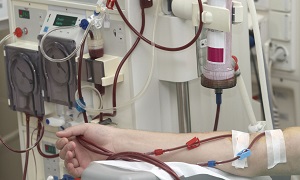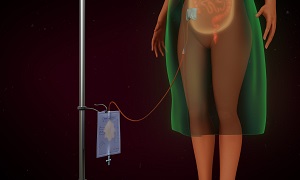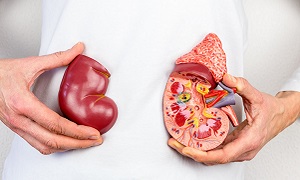Chronic Kidney Disease
Chronic kidney disease is a slow and progressive loss of kidney function over several years, in which the person eventually develops permanent kidney failure.
Also known as chronic renal failure, chronic kidney disease, is more widespread than people think, since it mostly goes undetected, and undiagnosed until the disease is at an advanced stage. Sometimes, it is even discovered when the function of the kidneys is down to 25 percent of normal. As this condition advances, the function gets impaired severely, and dangerous levels of fluid and waste can build up in the body rapidly. Treatment is therefore aimed at slowing down or stopping the progression of the disease, and this is often done by controlling the underlying cause.
Symptoms
If kidney damage progresses, then signs and symptoms of chronic kidney disease develops over time slowly. Some of the signs and symptoms include:
- Nausea
- Fatigue and weakness
- Vomiting
- Changes in how much you urinate
- Loss of appetite
- Sleep problems
- Decreased mental sharpness
- Muscle twitches and cramps
- Swelling of feet and ankles
- Persistent itching
- High blood pressure that becomes difficult to control
- Chest pain, if there is a build-up of fluid, around the lining of the heart
- Shortness of breath, if fluid builds up in the lungs
Sometimes signs and symptoms of kidney disease might be nonspecific, which means that they may be caused by other illnesses as well. The kidneys are highly adaptable and are also able to compensate for lost function, and therefore signs and symptoms might not appear until irreversible damage has occurred. If you see these signs and symptoms, then make an appointment with your doctor.
Causes & risk factors
Diabetes and high blood pressure are considered to be the most two common causes of chronic kidney disease. They are generally responsible for over two-thirds of the cases.
Diabetes occurs when your blood sugar is too high and causes damage to various organs in your body, which includes the kidneys, heart as well as blood vessels.
High blood pressure, also known as hypertension occurs when the pressure of your blood against the walls of your blood vessels increases. If it is not controlled properly, it can lead to strokes, heart attacks, or chronic kidney disease. Chronic kidney disease can also be a cause of high blood pressure. Some other conditions are also there, which might lead to kidney disease, some of them including:
- Glomerulonephritis, a group of diseases that causes inflammation and damage to the filtering units of the kidneys. These disorders are known to be the third common type of chronic kidney disease.
- There are also inherited diseases, such as polycystic kidney disease, which can cause large cysts to form in the kidneys and damage the surrounding tissue.
- Malformations can also occur as a baby develops in its mother’s womb. For example, there might be a narrowing that prevents the normal outflow of urine and causes it to flow back up to the kidney. This can lead to infections and might even damage the kidneys.
- Obstructions which are caused by problems like kidney stones, tumors, or an enlarged prostate gland in men
- Lupus and other diseases that affect the immune system of the body
- Repeated urinary infections.
The list of risk factors that can increase your risk of developing chronic kidney disease include:
- Diabetes
- High blood pressure
- Heart and blood vessel (cardiovascular) disease
- Obesity
- Smoking
- Family history of kidney disease
- Having an abnormal kidney structure
- Older age
People of African-American, Native-American, or Asian-American ethnicity are generally more likely to have this condition.
Diagnosis
First, your doctor is going to discuss your personal and family history with you, and might also ask questions about whether you have been diagnosed with high blood pressure, or if you have taken any medicine that can affect the function of the kidneys. He/she will also likely ask if you have any family members having kidney disease and if you have seen any changes in your urinary habits.
Next, your doctor will need to perform a physical exam, and check for signs of problems with your heart or blood vessels, and will also conduct a neurological exam.
Some other tests and procedures might also be required, which include blood tests, imaging tests, urine tests, and a kidney biopsy.
Treatment
Medications
Although there is no current cure for chronic kidney disease, there are some therapies that can help control the signs and symptoms, as well as reduce the risk of complications.
Patients suffering from chronic kidney disease generally need to take a large number of medications, and different kinds of treatments. Some of these include:
Anemia Treatment– Hemoglobin is the substance in red blood cells that carry vital oxygen around your body. When this hemoglobin becomes low, the patient is known to have anemia. Therefore, some kidney patients might require blood transfusions. A patient with kidney disease might also require iron supplements, either in the form of daily ferrous sulfate tablets or in the form of injections.
Skin itching- Patients with chronic kidney disease can also suffer from skin itching problems. In such cases, Antihistamines, like chlorphenamine, can help in alleviating symptoms of itching.
Phosphate Balance– People having kidney disease might also not be able to eliminate phosphate properly from their bodies. If this occurs, patients are generally advised to reduce their nutritional phosphate intake, which means reducing the consumption of red meat, fish, eggs as well as dairy products.
High Blood Pressure- A common problem among patients with chronic kidney disease is high blood pressure. It is important to bring it down to protect the kidneys, in order to slow down the progression of the disease.
Anti-Sickness Medications– If toxins build up in the body, because of the kidneys not working properly, patients might feel sick. Therefore anti-sickness medications can help to relieve this sickness.
End-Stage Treatment
End-stage treatment is required when the kidneys are functioning at less than 10-15 percent of normal capacity, and measures such as diet, medications, and treatments are no longer able to manage the condition. Dialysis or kidney transplant is needed to survive.
Doctors generally try to delay the need for dialysis or kidney transplant, as long as they can, because they carry the risk of serious complications.
Kidney Dialysis
Kidney dialysis can be of several types. The two main types include the following-
Hemodialysis
Hemodialysis involves blood being pumped out of the body of the patient, and it goes through an artificial kidney which is called a dialyzer. The patient undergoes hemodialysis three times per week, and each session lasts for at least three hours.
According to experts, more frequent sessions generally result in a better quality of life for the patient, and with modern home-use dialysis machines, this is becoming more possible.
Peritoneal dialysis
In peritoneal dialysis, the blood is filtered in the own abdomen of the patient, in the peritoneal cavity, which contains a vast network of tiny blood vessels. A catheter is implanted into the abdomen, into which a dialysis solution is infused and drained out for as long as needed to remove the wastage and excess fluid.
Kidney Transplant
Complications
Almost every part of your body can get affected by chronic kidney disease, and some of the potential complications include:
- Fluid retention, which may lead to swelling in your arms and legs, or even high blood pressure, or fluid in your lungs, which is termed as pulmonary edema
- A sudden rise in the potassium levels in your blood, i.e. hyperkalemia. This can even impair your heart’s ability to function and might be even life-threatening
- Weak bones which can lead to an increased risk of bone fractures
- Heart and blood vessel (cardiovascular) disease
- Decreased sex drive, reduced fertility or erectile dysfunction
- Anemia
- Damage to the central nervous system, which can cause problems in concentrating, and might even lead to personality changes or seizures
- Pericarditis, an inflammation of the saclike membrane that envelops your heart
- Decreased immune response, which can make you more vulnerable to infection
- Pregnancy complications that carry risks for both the mother as well as the developing fetus
- Irreversible damage to both kidneys, which is known as end-stage kidney disease. This can require dialysis or even a kidney transplant
Prevention
Generally, diabetes and high blood pressure are the most common causes of chronic kidney disease. If you are having diabetes or high blood pressure, work with your doctor, and make efforts to keep it in control, to prevent kidney ailment.
Living a healthy lifestyle helps to prevent diabetes, high blood pressure, and kidney disease. You may follow these tips for lowering the risk of kidney disease, as well as the problems that cause it.
- Follow a low-salt and low-fat diet
- Have check-ups regularly with your doctor
- Exercise for a minimum of 30 minutes for at least five days a week
- Limit the use of alcohol
- Avoid smoking or tobacco use





